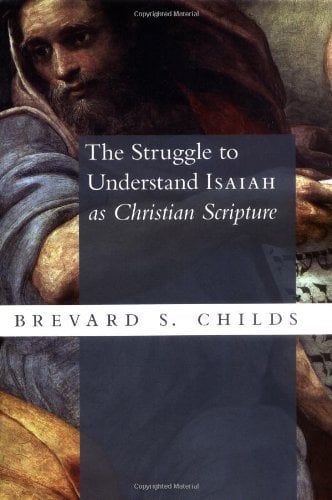Brevard Childs was one of the very great OT scholars of the late twentieth century and into this century, and his last major contribution to Biblical Studies is a book entitled The Struggle to Understand Isaiah as Christian Scripture (Eerdmans, 2004). What follows in the next series of blog posts is a detail synopsis of this important book with running commentary and critique. I would urge you to read the book for yourself and see what you think, as it provides actually a short course in the hermeneutics of how the OT has been interpreted by Christians over all of Christian history, and as such is worth the cost of the book just for that, never mind the illumination it provides on Isaiah.
—-
B. Childs last major contribution to the discussion of the book of Isaiah was published in 2004 under the title The Struggle to Understand Isaiah as Christian Scripture, (Eerdmans, 2004). He passed away in 2007 not long after this book began to have its impact. It focuses primarily on the ‘reception history’ of Isaiah in the church, and it quite appropriately raises the hermeneutical issues that need to be addressed with that whole approach to Scripture which is au courant these days. It will serve us well then to have a detailed interaction with the book and with that method here, in this Appendix. Let me be clear that it is the NT itself, and authors such as the author of 1 Peter 1.25b that encourage us to ask the question—How can the OT in general, and Isaiah be preached as ‘the Good News about Jesus Christ’, or should we in fact say we cannot follow the example of the NT writers in their handling of the OT and their early Jewish hermeneutical approaches to it?
As Childs readily acknowledges at the beginning of his study, many modern scholars and commentators of various sorts have treated the Christian interpretation of Isaiah (often including the interpretation by the NT writers themselves) as a guide to how one should not interpret the book, as a sort of ‘map of misreading’. Should we just ignore that critique and wrap our ‘canonical approach’ mantles around our shoulders for warmth and protection and just carry on with our ‘traditional’ Christian interpretation of Isaiah? Or should we engage the discussion in another way? It is easy enough to demonstrate various ways the church has misused and misinterpreted the Book of Isaiah. One only needs to do a cursory reading of Sawyer’s, The Fifth Gospel to find all kinds of examples of this practice, some of them truly distorting and distressing. Childs describes one of the raison d’etre for writing this book as “many of Christianity’s greatest scholars, from both the East and the West, have written commentaries or extensive treatises on Isaiah (Justin, Irenaeus, Jerome, Thomas, Luther, Calvin). Then again, most of the difficult exegetical problems surrounding the relation of the Old and New Testaments have found a focus on Isaiah.” Not far behind has been the focus on the Psalms in the Church as well, especially because the Psalter became an every Sunday resource in Christian liturgy from the early days of Christianity to the present in a way that Isaiah has not.













